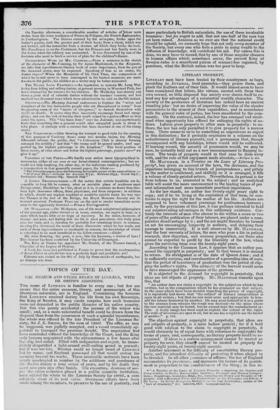TOPICS OF THE DAY.
THE MUSEUM AND OTHER RELICS OF LINNiiEUS, WITH DR. SMITH'S ADDITIONS.
THE name of LINN.'EUS is familiar to every one ; but few are aware that the entire museum, library; and manuscripts of this illustrious naturalist, are in England. Considering the honours that LINN2EU5 received during his life from his own Sovereign, the King of Sweden, it may excite surprise how such treasures were not deposited in the public libraries of his native country. But this was purely accidental : the income of the widow was small ; and, as a more substantial benefit could be drawn from the disposal than from the possession of such a splendid incumbrance, the whole was offered to the late President of the Linnwan Society, Sir J. E. SMITH, for the sum of 10001. The offer, as may be supposed, was joyfully accepted, and a vessel immediately appointed to transport the precious freight. The negotiation had been concluded without the knowledge of the Court, and the King only became acquainted with the circumstance a few hours after his ship had sailed. Filled with indignation and regret, he immediately despatched a light-armed swift-sailing v,essel in pursuit ; but it was too late. Sweden could no longer boast of LINN,EUS but by name, and England possessed all that would endear his memory beyond his works. These invaluable materials have been nearly quadrupled in number by the additions and purchases of Dr. SMITH during a long series of years, and by his death they risust now pass into other hands. The executors, desirous of seeing the entire collection placed in a public scientific institution have offered the whole to the Linnman Society for 0001., a sum infinitely short of its real value. Strenuous efforts have been made among the members, to preserve to the use of posterity, and more particularly to British naturalists, the use of these invaluable treasures : but.we regret to add, that not one-half of the sum has yet been raised. Anxious as we ever are that the national credit should be upheld, we earnestly hope that not only every member of the Society, but every one who feels a pride in using wealth to the diffusion of knowledge, will contribute his aid. For unless this is done, we may have to record, that by one of those singular chances in human affairs which sometimes occur, the present King of Sweden (who is a munificent patron of science) has regained, by purchase, what the British nation was too poor to keep.














 Previous page
Previous page